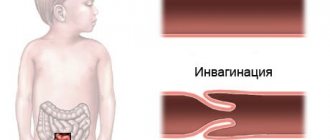Constipation is a very common problem in children. Why?
With the start of complementary feeding, babies' stools most often improve.
This is due to the introduction of fiber into the child’s diet, as well as an increase in the child’s physical activity. But after 1 year, the number of children suffering from constipation begins to increase again. This is due to giving up breastfeeding, switching to solid foods, and reducing the amount of water in the diet. Approximately every fifth child suffers from constipation after one year. How to deal with this problem? For your health - recommendations from the pediatrician of the ENT Plus clinic, a doctor of the highest category, Anna Gennadievna Marakulina.
What can a difficult bowel movement or its absence indicate in children under 1 year of age?
You should not self-medicate constipation in children under 1 year of age.
Separately, it is worth highlighting the age category of infants up to 2 months.
It is important for parents to know that if their children at this age experience difficulties with defecation, then under no circumstances should they resort to traditional medicine or self-medicate.
This behavior can only make the situation worse. The most correct decision would be to contact specialists, in particular pediatricians.
Abnormal bowel movements in infants can be caused by a number of reasons, which include:
- deficiency of breast milk in the mother, which can cause so-called “hunger constipation” in the child. In this case, all the nutrients entering the baby’s body are absorbed and there is simply nothing for him to excrete;
- allergy to goat's or cow's milk. It can be observed in children aged 3-3.5 months (and older) if they receive food in the form of porridge prepared with cow's or goat's milk. Some babies develop intolerance to proteins found in goat or cow milk, because they are, in principle, foreign. However, there are not many such cases;
- changing from one type of feeding to another. An example would be switching from breastfeeding to formula feeding, or changing the type or brand of formula;
- It is known that women are advised not to consume certain foods during breastfeeding. Violation of these rules may lead to constipation in the baby, since the body of an infant is very sensitive to the slightest changes in the mother’s body;
- introduction into the children's diet of products “not appropriate for age”, that is, those that are not yet recommended to be consumed during this period. If you start giving a product too early that is not intended for a specific age group, then this product will not be fully absorbed;
- colds and infectious diseases in a child, accompanied by hyperthermia (fever);
- insufficient fluid intake into the baby’s body. This is often observed during artificial feeding or during the introduction of complementary foods. Therefore, mothers must ensure that their children receive the required amount of fluid;
- lack of muscle tone in the intestines. This pathological condition is diagnosed only during a medical examination.
If the cause of constipation in a baby is found out, then following the instructions of doctors you need to eliminate the cause and at the same time fight constipation.
The process of normal release of processed nutrients by the body is extremely important, the health and well-being of the baby depends on it.
How to avoid constipation in a child?
To prevent constipation, your child should drink enough fluids. It is imperative to teach your child to drink plain water. A child over 3 years old needs to drink at least 2 glasses of water a day.
— It is not recommended to give your child sweet and carbonated drinks, strong tea and coffee. They have a diuretic effect and contribute to the development of dehydration and constipation. — Cold water stimulates peristalsis. And warm water has a relaxing effect on the muscles of the gastrointestinal tract and is quickly absorbed. Therefore, for constipation, it is recommended to give a child under 3 years old 1/2 glass, and over 3 years old - 1 glass of cool water in the morning on an empty stomach. You need to start with water at room temperature. If the effect is not achieved and health conditions allow, the water temperature is gradually reduced. It should be pleasantly cool. In this case, peristalsis is stimulated by rapid filling and irritation of the stomach and then the intestines. — There are drinks that have a laxative effect. Fermented milk products, plum and beet juice, dried fruit compote (prunes, dried apricots, raisins), chamomile decoction, children's teas with fennel and dill. By including these drinks in your child's diet, you can achieve regular bowel movements. But this must be done gradually, starting with small quantities, so as not to cause digestive breakdown in the child.
Constipation from vitamin D3
Sometimes mothers notice constipation in their babies when they start giving them vitamin D3 for prevention. This is more a coincidence than a consequence of taking the vitamin, since taking it in the prophylactic dose prescribed by the pediatrician does not cause such an effect. But an overdose of vitamin D3 can cause constipation. The fact is that vitamin D3 promotes the absorption of calcium in the intestines. In turn, excess calcium in the intestinal contents leads to the formation of difficult-to-digest compounds that thicken the stool. Do not violate the recommended dosage. With vitamins, as with other medications, more is not better.
Does diet help with constipation?
Everyone knows that a diet for constipation should include many foods rich in fiber, and these are vegetables and fruits. But not everyone knows how much and what kind of fruits and vegetables a child needs.
| 1-3 years | 3-7 years | Over 7 years old | |
| Total vegetables (including potatoes) | 350 grams (120) | 450 gr (250) | 550 gr (250) |
| Fruits | 100-150 gr | 250 gr | 250 gr |
| Fresh vegetables | 50-70 gr | 150 gr | 200 gr |
| Juices | 200 gr | 200 gr | 200 gr |
| Dried fruits | 10-15 grams | 200 gr | 200-300 gr |
Yes, for most children, to normalize stool, it is enough to simply establish a drinking regime and regularly feed the child fruits and vegetables in accordance with age. But not for everyone.
Some people need to enrich their diet with products with a laxative effect. These include: plums, beets, prunes, raisins, figs, dates, dried apricots, legumes, nuts. They should be present in the diet of a child prone to constipation. You need to include them in your diet gradually. For some, it will be enough to consume one of the listed products daily, while others will need to include several in their diet.
Porridges made from cereals with a shell (buckwheat, oatmeal, pearl barley, wheat) and wholemeal bread are also useful.
Fermented milk products (kefir, yogurt, fermented baked milk, biolact) are best consumed before bed. 1 glass per day is enough. You can increase your daily kefir consumption to 2 glasses per day.
Refined rice, blueberries, pears, sweets and baked goods, flour products made from premium flour, strong tea, and animal fats have a fixing effect. It is better for children prone to constipation to abstain or significantly limit their use.
I recommend trying several recipes for constipation that I and my patients have tested:
— Take equal quantities of dried fruits: figs, dates, dried apricots, prunes, wash well, pour over boiling water, remove seeds, grind through a meat grinder or grind in a blender. Take 1-2 teaspoons daily in the morning on an empty stomach (30 minutes before meals), with 1 glass of water with lemon. Children under 3 years old - 1/2 glass of water.
This recipe can be used by children from 1 year old, but be sure to first test how the child tolerates each dried fruit individually, and then prepare the mixture.
— Sour milk + prunes at night: wash 10-20 prunes well, brew with boiling water for 5-10 minutes, you can make a puree for a small child. Eat before bed, washed down with 1 glass of kefir, biolact, fermented baked milk, yogurt.
Wheat bran is a very useful product because... contain approximately 50% fiber, as well as many vitamins and microelements. You can buy them at the pharmacy. Wheat bran can be included in the diet of children after 1 year as a remedy for constipation. Start with a daily amount of 1 teaspoon, gradually, every 2-3 days, increasing the dose until regular bowel movements are achieved. The maximum dose for children is up to 2 tablespoons per day. The daily dose of bran is brewed with a small amount of boiling water. Leave it covered for 30-40 minutes, then excess water is drained, and the swollen bran is added to the child’s food, most often to porridge. You can also add them to kefir, cottage cheese, vegetable and fruit purees. You can add the entire daily dose of bran to one serving of food; you can divide it evenly into breakfast, lunch and dinner.
Constipation symptoms
- The intestines are emptied irregularly (less than once every 36 hours).
- Feces are dry and hard, which means that later the child may try to hold in feces, since the last time a bowel movement caused him pain (this is important for older children).
- The baby pushes hard, pulls his legs to his chest, but his efforts do not produce any results.
- The baby is capricious, frowns on his face, and cries when trying to empty his bowels.
- The child has restless sleep and refuses to eat.
- Abdominal bloating is observed.
Other conditions can lead to similar symptoms, so you should definitely see a doctor to make a diagnosis.
Exercises for constipation. Does it help or not?
In my experience, it really helps! Active and mobile children are less likely to suffer from constipation. To prevent constipation, exercise is useful: running, swimming, gymnastics, squats, bending, abdominal strengthening exercises.
A child suffering from constipation, in addition to following a diet and drinking regime, is recommended to perform several simple actions in the morning:
— Get up early so that you have enough time for all morning activities, including going to the toilet, — Drink 1 glass of cold water on an empty stomach (you can with a mixture of dried fruits), — Perform the following exercises — Starting position standing: take as deep a breath as possible, then take a deep breath exhale, then pull your stomach in as much as possible and stick it out. Repeat the exercises several times. There is a high probability that after this the child will want to visit the toilet. Abdominal massage is also useful.
Pediatric gastrointestinal disorder
More often, disruption of the gastrointestinal tract occurs in children who are bottle-fed or mixed-fed. This is due to the fact that in the first year of life the baby’s digestive system is prepared by nature to absorb mother’s milk, and infant formula is created according to the model of breast milk and is only as close as possible to its composition. However, sometimes it happens that disruption of the gastrointestinal tract occurs in infants. There may be several reasons - from the mother’s unsuitable diet to nervous disorders. What to do if your newborn is constipated? First of all, go to the doctor.
Diagnostics
A pediatrician examines children who retain stool. If necessary, a pediatric gastroenterologist is involved in consultation. The specialist collects a detailed medical history and identifies predisposing factors, dietary changes, and concomitant diseases. To verify the cause of constipation, an instrumental examination of the gastrointestinal tract and laboratory methods are prescribed. The most informative:
- Finger examination
. Assessing the condition of the rectal ampulla is the first thing to do when a child is constipated. During the examination, fecal stones, large neoplasms, and places of greatest pain are determined. Before the examination, the abdomen is palpated to detect bloating, spasms, and an increase in the size of the sigmoid colon. - Ultrasonography
. Ultrasound of the abdominal cavity is a simple non-invasive diagnostic method that shows signs of inflammatory processes, abnormalities in the structure of the digestive tract, and suspicious neoplasms. Additionally, using an ultrasound sensor, a targeted ultrasound of the liver and pancreas is performed. - Radiography
. A survey X-ray of the abdominal cavity is quite informative and allows one to detect dilation of intestinal loops and signs of intestinal obstruction. To check the condition of the colon, barium irrigography is prescribed, which is performed after an enema. Sometimes radiography of barium passage through the gastrointestinal tract is used. - Coprogram
. Microscopic examination of stool includes determination of undigested food particles, fatty acids, red blood cells and white blood cells. Bacteriological culture of stool is required to exclude dysbacteriosis. The stool is examined for helminth eggs and the presence of protozoal infections. - Laboratory indicators
. If a child has persistent constipation, a biochemical blood test and liver tests are performed to rule out concomitant hepatobiliary disorders. If endocrine diseases are suspected, the hormonal profile is examined. Sometimes a highly specialized toxicology blood test is indicated. - Additional methods
. To exclude organic pathology and intestinal tumors, sigmoidoscopy or colonoscopy is recommended. To diagnose Hirschsprung's disease and UC, a biopsy of the intestinal wall is taken during the study. If there are signs of nervous system disorders, you need to consult a neurologist, EEG and EchoEG.
Causes of constipation
- Immaturity of the digestive organs.
Due to the fact that the gastrointestinal tract of a newborn is still just adapting to new conditions, there may be various functional disruptions in its functioning. - Immaturity of the nervous system.
The lack of maturity of the baby’s nervous system prevents him from correctly recognizing signals about the need to defecate. - Somatic diseases.
Rare pathologies include dolichosigma (increase in the length of the sigmoid colon), lactase deficiency (lack or insufficient amount of enzymes to break down lactose), Hirschsprung's disease (accompanied by impaired innervation in the intestine). Constipation can be caused by colds and viral diseases, leading to dehydration of the child's body. Also, constipation can be one of the manifestations of hypothyroidism, rickets, liver diseases, myasthenia gravis and some other disorders. - Nutritional features.
If a child is breastfed, then the mother’s poor nutrition can affect the functioning of his gastrointestinal tract. Doctors recommend that nursing women exclude confectionery, fatty broths, cheeses, and nuts from their diet. In artificially born people, constipation can be caused by a lack of fluid. Also, a sudden change in the brand of the mixture can lead to disturbances in this area. - Taking certain medications.
Constipation can be a reaction to treatment of the mother or baby with antibiotics, anticonvulsants and antispasmodics. - Psychological problems.
Children often suffer from constipation, whose parents are constantly under nervous tension, often irritated, and violently solving some family problems.










